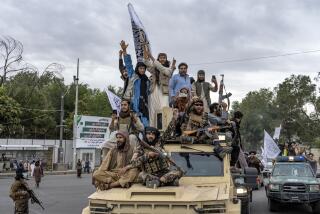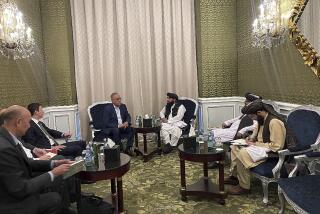Taliban Orders Journalists Out of Afghan Town
- Share via
SPIN BULDAK, Afghanistan — The Taliban government told a group of more than 150 foreign journalists it had invited into the southern part of the country still under its control that they had to leave on short notice Thursday because their security could not be guaranteed.
The decision came less than 24 hours after a spokesman for Taliban supreme leader Mullah Mohammed Omar traveled from Kandahar to this border town for a news conference, during which he suggested that the movement would attempt to arrange a visit by reporters to the Taliban stronghold. The movement was apparently interested in showing reporters the suffering of civilians in Kandahar because of the U.S.-led bombing campaign.
However, with security beginning to deteriorate around the government compound where the journalists were being housed, the Taliban decided that the reporters should leave immediately.
“This time the program is over,” said Najibullah Akhund Shirzai, the Taliban’s chief of public security for Spin Buldak. “The next time, we hope you will come back and go to Kandahar.”
In the past, the Taliban has taken reporters on several guided trips without incident, including one weeklong visit to Kandahar.
Reporters were escorted back to the Pakistani border Thursday by armed Taliban soldiers driving Toyota Corolla station wagons.
The sudden departure appeared to be triggered by worries that the Taliban might not be able to protect the group from angry local men, many of whom sat on the compound’s perimeter walls.
When the reporters first arrived, young men hoisted themselves up so that they could watch the journalists set up large satellite antennas used by television teams along with tents and sophisticated electronic equipment for radio broadcasts. Taliban soldiers armed with sticks walked along the walls shooing away those who seemed to be on the verge of swinging their legs over to jump in.
But the mood on the second day was more threatening. The walls and roofs of the compound buildings were lined with young men, dangling their legs and seemingly daring the Taliban to stop them.
They hissed at the few women reporters in the group when they walked by to use the latrines. Some young men entered the compound, and a swarm of them mobbed the gates, making it difficult for reporters to leave the site.
There is strong anti-American sentiment in this part of Afghanistan. People in the southern part of the country have faced some of the most relentless American bombing and have had streams of refugees arrive on their doorsteps.
Afghan translators said that when the reporters arrived, some local people accused the Taliban of befriending Americans, whom they view as the enemy.
The Taliban seemed to have only limited power here. Its forces were able to clear the way for journalists to leave and kept the majority of men from jumping over the wall, but they were forced to withdraw an offer to take reporters to see a nearby refugee camp.
Hamdullah Hafeez, who had been the No. 3 official in the Taliban Foreign Ministry in Kabul before the capital fell, said that ordinary Afghans are now enormously suspicious of all foreigners, regardless of whether they come from the Arab world or the West.
“Feelings against foreigners are running very high,” he said.
More to Read
Sign up for Essential California
The most important California stories and recommendations in your inbox every morning.
You may occasionally receive promotional content from the Los Angeles Times.













